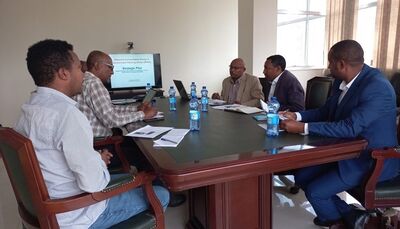Supporting a Strengthened Policy and Strategy Framework for Improved Energy Access in Displacement Settings
GIZ collaborates with UNHCR and Refugee and Returnees services (RRS) to strengthen the policy framework on energy in humanitarian settings, assisting the Ethiopian government in providing market-based and sustainable energy solutions to 3 million people in refugee hosting areas. To that end, the ESDS project facilitates agenda coordination and exchange through the steering structure of the UNHCR Energy and Environment Working Group (EEWG).
As Ethiopia strives to fulfil its energy pledge, ESDS seeks to strengthen national and subnational policies and strategies. ESDS Ethiopia has been working with Multi actors' (humanitarian and development) involvement in process of strategy development which include recently finalized Multi actor’ Cooking Energy Strategy (MCES) to be implemented in refugee and host communities in Ethiopia for the period 2022-2030. This strategy has undergone a series of validation and endorsement by key government partners mainly RRS and Ministry of Water and Energy (MoWE) at the national level and was officially launched in December 2022. The strategy will ensure operationalization of sustainable energy access in displacement setting and aligned with national Energy policies of the Government of Ethiopia.
ESDS Ethiopia aims to support institutions entrusted with policy formulation, priority setting, and coordination of all energy sector development activities to coordinate and ensure consistency in energy resource development and to avoid resource waste and duplication of efforts in displacement settings. Aligning with this, the intervention will also work on national policies on electrification, resource management, and E-waste in displacement settings.
Activities being conducted and envisioned:
- Supporting key partners RRS, UNHCR, MOWE and EEWG) in adoption and operational implementation of strategies.
- Need-based capacity building of government, humanitarinan, and development partners.
- Facilitate energy and environment symposiums and events to enable the national and local government and other partners to streamline humanitarian energy needs into their planning processes. The endorsement of electrification and natural resource management.
- Facilitate the national EEWG to maintain energy pledge monitoring platform and assist in compiling and disseminating the knowledge and lessons learnt.





















